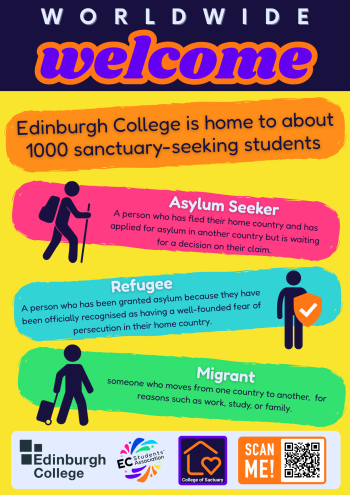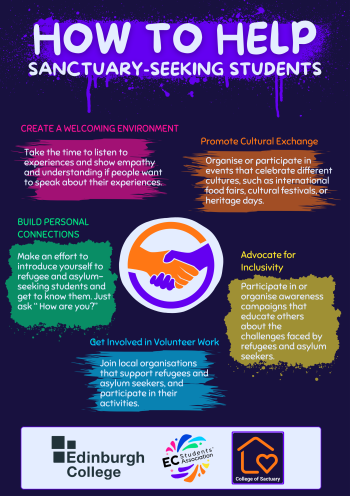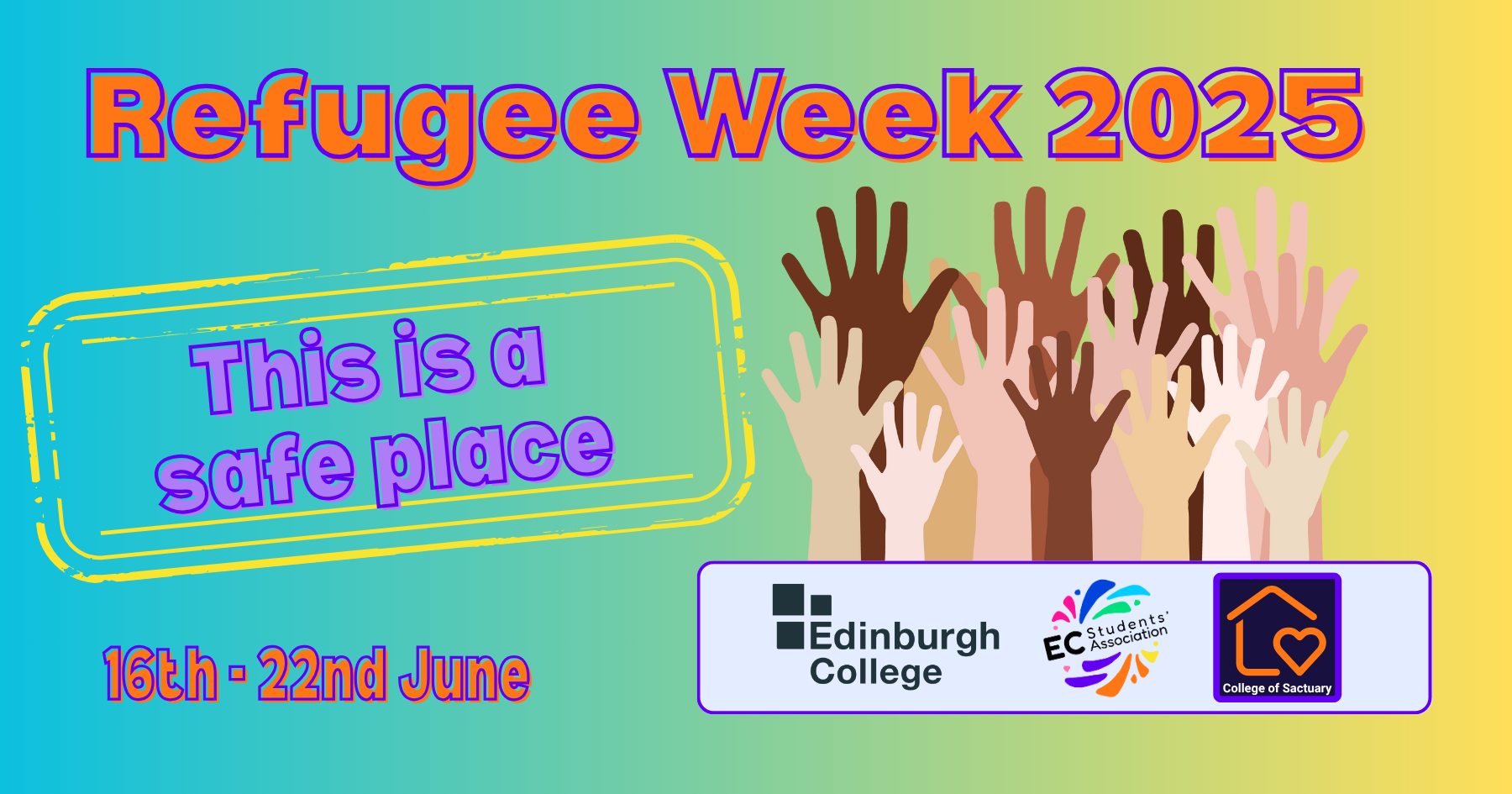Migration: Types, Challenges, and Reflections
The following is an article written by our Student Engagement Assistant, Zahra, originally from Iran, building a new life at Edinburgh College.
Nowadays, one of the most important global issues is migration — not only for developed countries, where many people tend to relocate, but also for the countries of origin and the migrants themselves.
Migration can create several challenges in host countries, such as unanticipated population growth, which increases the demand for educational, recreational, and urban facilities.
Moreover, for the countries of origin, migration is a key reason why they cannot develop properly. In most cases, educated and employable individuals leave their homeland, leading to a brain drain.
 Immigrants — a damaged and vulnerable group — are generally divided into different categories: refugees, asylum seekers, and migrants. These terms describe people who are on the move, have left their countries, and have crossed international borders.
Immigrants — a damaged and vulnerable group — are generally divided into different categories: refugees, asylum seekers, and migrants. These terms describe people who are on the move, have left their countries, and have crossed international borders.
A refugee is someone who has fled their country due to serious threats to their life, such as war, persecution, or conflict with the government. This may be caused by their religion, ethnicity, sexual or gender identity, political opinion, violence, hunger, or extreme poverty.
An asylum seeker is a person who was forced to leave their country and is seeking protection from persecution or serious human rights violations in another country but has not yet been legally recognized as a refugee. Seeking asylum is a human right, and everyone should be allowed to enter another country to request it.
A migrant is someone who leaves their country to find better opportunities, such as work, education, or to reunite with family.
Common issues faced
Although their reasons for leaving may differ, these groups share many similarities. First, they are far from their homeland, where they were born and raised, and separated from family and friends. This often results in loneliness, social isolation, and emotional stress. Not knowing the language of the host country makes all of this even harder.
Moreover, many of these individuals — especially refugees and asylum seekers — experience physical and mental health issues due to the difficult and sometimes traumatic events they faced during their journeys.
Other common challenges faced by migrants include:
Legal Issues and Residency Status
Many migrants, especially asylum seekers or undocumented individuals, face legal complexities, delays in obtaining residency, or fear of deportation. This is even harder for those separated from family members, and they may only reunite after gaining legal status.
Discrimination and Racism
Migrants may experience racial prejudice or discrimination at work, in schools, or when accessing public services.
Economic Challenges and Employment
Finding a job can be very difficult due to language barriers, lack of recognized qualifications, or limited work experience. Even skilled migrants may be forced to accept low-paying or unqualified jobs.
Educational Inequality
Children of migrants often struggle in school because of language differences, cultural barriers, or a lack of academic support tailored to their needs.
Difficulties Integrating into Society
Migrants can feel isolated or excluded when they struggle to adapt to the cultural norms and lifestyle of the host country.
Limited Access to Healthcare and Mental Health Services
Those without permanent legal status or health insurance may not receive proper medical care. Some are unaware of how to access services, while others avoid them due to high costs.
Cultural Identity Conflict
Migrants often face pressure to assimilate, which may clash with their desire to preserve their cultural identity, language, or religion, leading to emotional stress or identity crises.
Suggested Solutions
 To help migrants overcome the many challenges they face, governments, educational institutions, and communities can take the following steps:
To help migrants overcome the many challenges they face, governments, educational institutions, and communities can take the following steps:
Language Support Programs
Offering free and intensive language courses can greatly improve migrants' ability to integrate and succeed in work or education.
Recognition of Foreign Qualifications
Governments should create systems that recognize foreign diplomas and professional experience, allowing skilled migrants to work in their field.
Employment Assistance
Job training programs and workshops on writing CVs, interview skills, and job search techniques can help migrants find suitable work.
Legal Aid and Residency Support
Providing free legal support can help migrants navigate complex residency and asylum systems and reduce fear and uncertainty.
Affordable Public Transport for Students and Low-Income Families
Reducing or covering the cost of transportation allows migrants easier access to schools, jobs, and services.
Cultural Orientation and Mental Health Services
Support programs that address emotional well-being and teach about the local culture, laws, and rights can improve mental health and ease integration.
Flexible Education Schedules
Colleges can adapt class hours for parents—especially mothers—so they can attend classes after dropping children off at school.
Community Engagement
Encouraging local communities to interact with migrants through cultural events, volunteer opportunities, or language exchanges can reduce racism and promote inclusion.
Citizenship Education for Migrants
Migrants often come from a wide range of cultural backgrounds and may not be fully familiar with the legal, social, and cultural expectations of life in their new country. Offering citizenship education programs can help them understand their rights and responsibilities, how the society functions, and how to live respectfully within the law. This not only supports migrants in adapting smoothly but also benefits the host country by reducing misunderstandings and challenges that stem from cultural differences—not from bad intentions. In general, migrants benefit greatly from having an assigned guide or advisor they can contact in case of serious need or questions during their settlement process.
Conclusion
In conclusion, migration is a complex but unavoidable part of today’s world. Although migrants, refugees, and asylum seekers face many serious challenges, these can be reduced through practical support, inclusive policies, and human-centered approaches. By recognizing their struggles and offering real solutions, host countries can turn a difficult journey into an opportunity—for both the migrant and society as a whole.
Zahra Maleki
Student Engagement Assistant
College of Sanctuary Project
Resources:
1. Using questionnaires and field data collection - Student Stories Project
2. Amnesty International - https://www.amnesty.org/en/what-we-do/refugee-asylum-seekers-and-migrants/
3. College of Sanctuary Project - https://ecsa.scot/sanctuary

